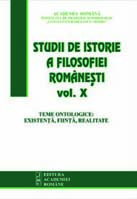Perspectiva nietzscheană asupra existenței în literatura română postmodernă
Nietzsche's stance regarding existence and its dissemination amidst Romanian postmodern literature
Author(s): Andrei Simionescu-PanaitSubject(s): Philosophy
Published by: Editura Academiei Române
Keywords: Will to power; nihilism; transmutation of values; intentional repertoire; region of sense; the idol and its meanings after Nietzsche; Romanian post¬modern literature.
Summary/Abstract: Nietzsche's view on existence is constituted by the recurring usage of his “will to power”, by his understanding of nihilism, together with the correlation between the two fundamental hypostases of the philosopher: the “physiologist” and the „artist”. The article aims to show that Nietzsche's perspective has a similar thought attitude, despite the existing gaps in time and culture, in Romania's postmodern literary scene, through Nicolae Stan's Apă neagră novel (transl. Blackwater). It is to be stressed out that by no means can direct correlations between nietzschean “concepts”, and characters or narrative situations, occur. Because of Nietzsche's basic philosophical tenet of life-thought unity, the present interpretation will unfold by underlining the prime importance of “sense” (and “sense-making”). It will be shown that both Nietzsche's philosophy regarding existence and Stan's intentional repertoire aim semantically at a third unexplicit region of sense, that emerges from and around the notion of “idol”. It will also be brought to light that Nietzsche's own intentional repertoire will have permanently modified this third unexplicit region of sense, by imposing a transmutation on the “idol” itself, a transmutation that comes from both Nietzsche's and Stan's intentionalities.
Journal: Studii de istorie a filosofiei româneşti
- Issue Year: X/2014
- Issue No: 10
- Page Range: 143-154
- Page Count: 12
- Language: Romanian

